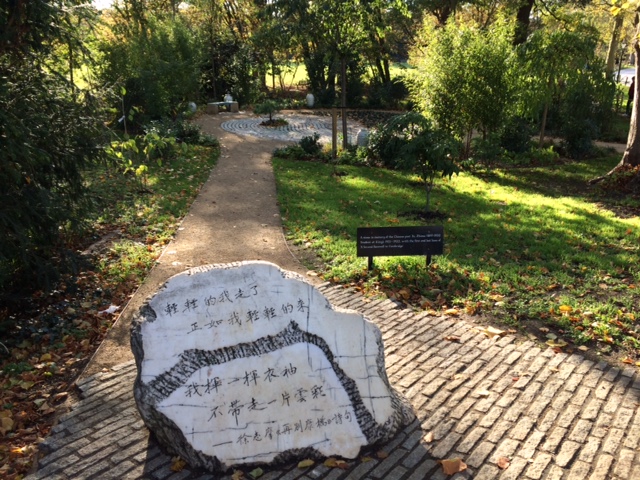
The Xu Zhimo memorial stone at King’s College in Cambridge is inscribed with lines from the Chinese writer’s famous poem, “Farewell to Cambridge” (Photo courtesy of King’s College)
Cultural, educational experiences are an increasingly important aspect of Chinese outbound travel. Chinese tourists overseas, especially those to Europe, tend to be highly educated, and literary links can be used effectively for destination marketing. The key is to first identify the opportunities, and also make literary attractions accessible to a Chinese audience. Drawing on examples from around Europe, we’ve created a list of four essential tips for marketing to Chinese bookworms.
1. Identify Chinese interest in local writers
How can you tell if a local literary figure is known in China? Some preliminary online research can help here – looking for them on Chinese search engine Baidu to learn their Chinese name; checking lists of the best-selling foreign authors in China (you can find lists for 2012 with slightly different results here and here); or looking up a literary tourism destination on Chinese travel review websites like Mafengwo or Qyer.
Comparing Chinese travel websites to Western ones can be eye opening: On Mafengwo, the top-rated restaurant in Edinburgh and the second top-rated attraction are The Elephant House, the café where JK Rowling wrote the first Harry Potter book. To compare, this same restaurant is ranked around 1,000 out of 2,000 restaurants in Edinburgh on Tripadvisor.co.uk. JK Rowling has been China’s best-selling foreign author at least twice over the past decade.
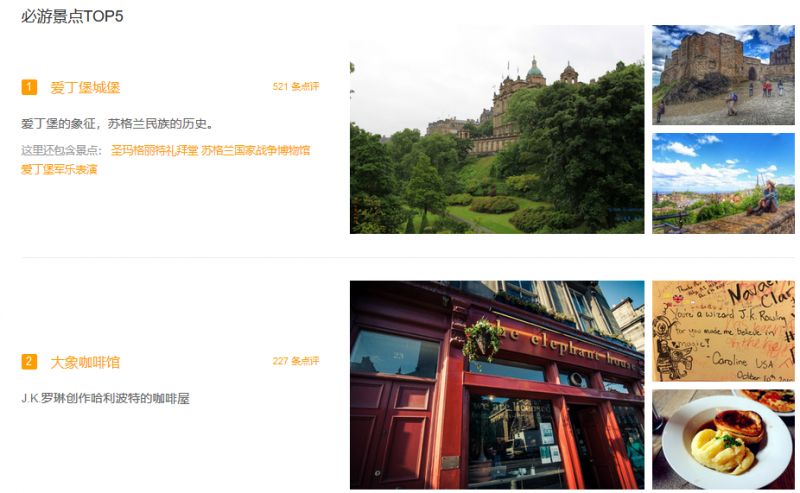
The “must-visit attractions” list for Edinburgh on Chinese travel website Mafengwo. The Elephant House, where JK Rowling wrote Harry Potter, is no. 2, topped only by Edinburgh Castle.
The results may not be so striking for other destinations, but they still show that literary tourism spots stand out for Chinese travelers. The Jane Austen Centre is ranked in 9th place on Qyer for attractions in Bath, UK; on Tripadvisor.co.uk, it’s number 35. The Kafka Museum in Prague is ranked as the 115th most popular attraction on Tripadvisor.co.uk, but it comes in 20th on Qyer.
If you work at a literary tourism destination, you may consider asking about visitors’ nationality when selling tickets to make sure you know if you’re receiving sizeable amounts of Chinese tourists. This can be determined even less intrusively by tracking the number of Chinese-language written or audio guides used by visitors, if these are available.
2. Identify Chinese writers’ connection to your destination
Perhaps more challenging but potentially with much greater effect is to identify if your overseas destination has any link to popular Chinese writers. Here, we have two standout examples of destinations that made the connection and have excelled in promoting it.
As part of Cambridge University, King’s College is already an attractive tourist destination for visitors from all over the world, but this educational institution has a special link to China: the famous Chinese poet Xu Zhimo studied there for 18 months in 1921-22, and in 1928 wrote “Farewell to Cambridge,” a poem that is widely taught in Chinese schools.
Now, “Chinese visitors represent about 15% of the total number of paying visitors who come to King’s each year,” says Sarah Friswell, Head of Visitor Services at King’s College. “Many come to see the memorial stone located near the River Cam in the grounds of the College, donated to the College in 2008, which has the first and the last two lines of the poem ‘Farewell to Cambridge’ inscribed on it,” she explains.
From 2015, King’s College has hosted an annual Xu Zhimo Poetry and Art Festival, and in 2018, the College opened the Xu Zhimo Memorial Garden, where the memorial stone is located.
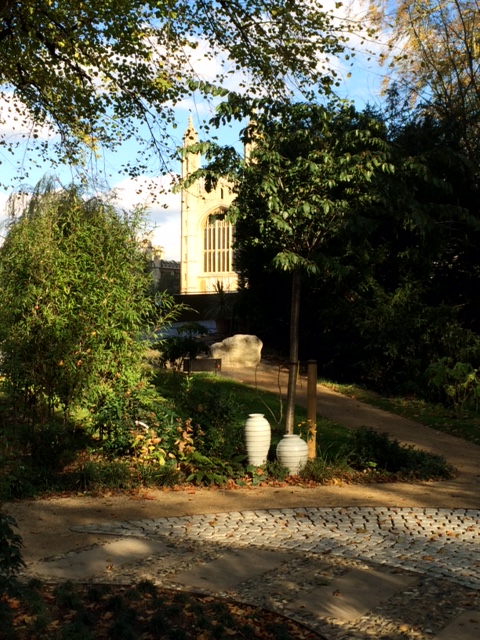
The Xu Zhimo Memorial Garden at King’s College Cambridge (Photo courtesy of King’s College)
In the 1970s, Taiwanese writer Sanmao lived in Spain’s Canary Islands for a number of years. The writer, who died in 1991, has a cult following in China, and her former residences on La Palma and Gran Canaria islands are both open to the public. For years, Chinese travelers have been posting travel tips and diaries for visiting places related to Sanmao in the Canary Islands, such as this 2017 Mafengwo travel diary.
After discovering a growing influx of Chinese tourists making pilgrimages to their beloved writer’s former home, Spanish and Canary Islands tourism authorities developed a special Sanmao-themed route for Chinese visitors. They invited a Chinese travel influencer and a travel journalist for a five-day trip in May 2017, and published a three-part guide on WeChat in July and August of 2017. The guide highlights attractions such as Sanmao’s former home, the vegetable market where she used to shop, the grave of her Spanish husband, and a memorial plaque (in Chinese, Spanish and English) on a small Spanish island. The WeChat posts also give recommendations for accommodation, entertainment and dining – even a local Chinese restaurant near Sanmao’s former residence is included, alongside a photo of her eating there in the 1970s.
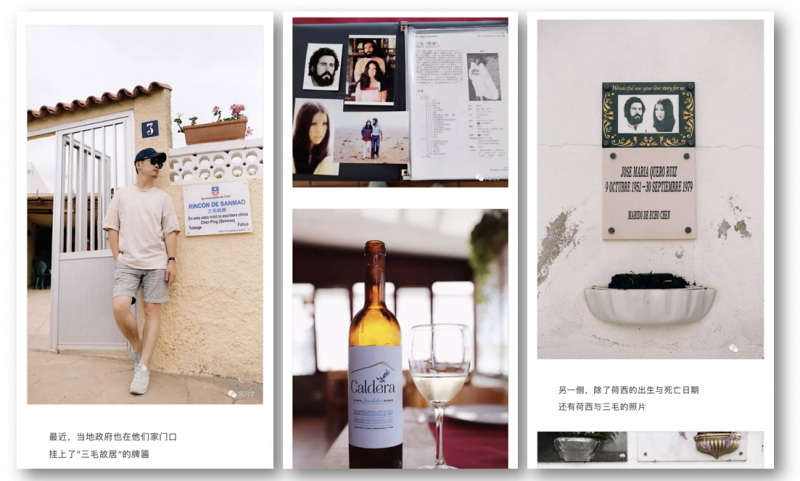
In 2017, the Spanish Tourism Board published a three-part guide on WeChat to a route through the Canary Islands to visit locations related to Taiwanese writer Sanmao, who lived there in the 1970s
3. Make it accessible
While there is a Chinese audience for overseas literary attractions, there’s still a lot of improvement that could be made in delivering a good guest experience. At the Jane Austen Centre, the doorman – dressed in Jane Austen-era clothing – knows to greet Chinese tourists with “nihao”, which is very well received, but there are no materials available in Chinese once visitors cross the threshold. Online reviews of both the Jane Austen Centre and the Kafka Museum mention the lack of Chinese-language materials, and not being able to understand the guides or printed descriptions.
King’s College, on the other end of the spectrum, has made significant efforts to accommodate Chinese visitors and Xu Zhimo fans. The College provides information leaflets and guidebooks in a number of languages, including Mandarin. “The King’s College Visitor Centre (its shop) also stocks a range of merchandise related to Xu Zhimo including collections of his poems, keyrings and bookmarks. A limited edition Royal Crown Derby plate with the words of the poem and a limited edition fountain pen are also available to buy,” says Friswell.
4. Use it for marketing
Once you know the literary appeal of your destination, incorporate this into your marketing strategy to pull in Chinese readers who might not know the connection between a place and their literary heroes. Although none of the Harry Potter movies were actually filmed anywhere in Edinburgh, the city’s WeChat account has made use of their connection to JK Rowling. In November, they published a Harry Potter-themed guide to Edinburgh, which got over 2,300 views and a significant amount of reader interaction.
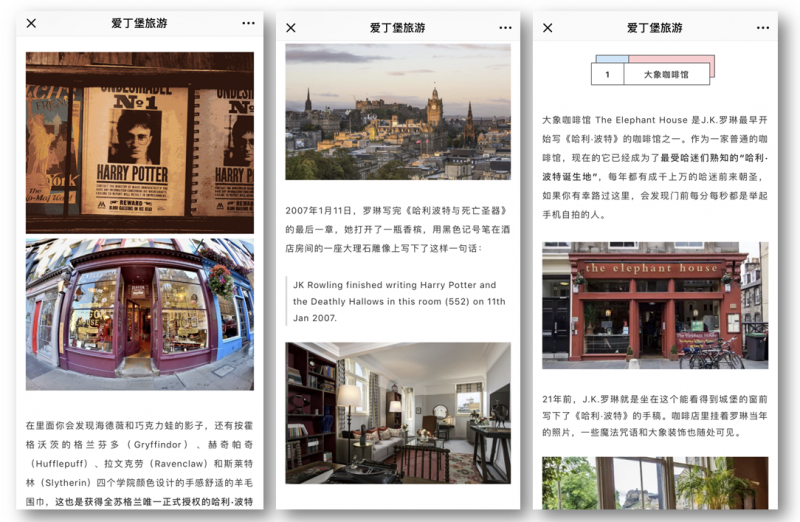
Edinburgh’s November 2018 Harry Potter-themed WeChat post includes locations around the city where JK Rowling wrote, as well as Harry Potter shopping opportunities
Visit Finland and My Helsinki have also both published WeChat articles in the past year about the Moomin books by Finnish author Tove Jansson, and Moomin-related businesses and attractions in Finland. The audience for these posts has been fairly limited, but the content may still help to capture a different niche market and give a destination more depth and variety in the eyes of potential visitors.

The Finnish and Helsinki tourism accounts on WeChat have both published content relating to writer Tove Jansson and her Moomin characters
Sign up for our free newsletter to keep up to date on our latest news
We do not share your details with any third parties. View our privacy policy.
This website or its third party tools use cookies, which are necessary to its functioning and required to achieve the purposes illustrated in the cookie policy. If you want to know more or withdraw your consent to all or some of the cookies, please refer to the cookie policy. By closing this banner, scrolling this page, clicking a link or continuing to browse otherwise, you agree to the use of cookies.